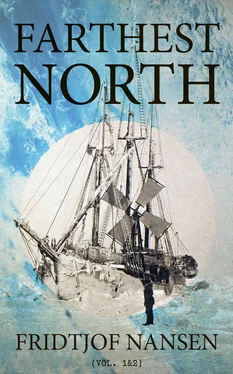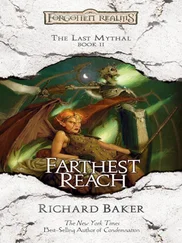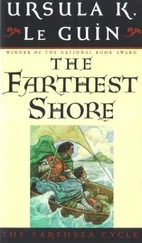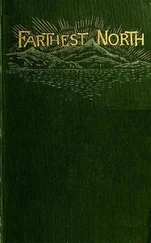“On July 30th [this ought to be 29th] Trontheim saw from the shore, first, smoke, and soon after a steamer. There could be no doubt of its being the Fram . He went out in a little Samoyede boat to meet her, and called out in Russian that he wanted to be taken on board. From the steamer they called back, asking who he was, and when they heard his name he was hauled up. On deck he met Nansen himself, in a greasy working-jacket. He is still quite a young man, of middle height. …” Here follows a flattering description of the leader of the expedition, and the state of matters on board. “It is evident,” he then goes on, “that we have here one family, united and inspired by one idea, for the carrying out of which all labor devotedly. The hard and dirty work on board is fairly divided, no difference being made between the common sailor and the captain, or even the chief of the expedition. The doctor, too, takes his share in the general work, and this community of labor is a close bond between all on board. The existence of such relations among the ship’s company made a very favorable impression on Trontheim, and this most of all (in his opinion) justified the hope that in difficult crises the expedition would be able to hold its own.
“A. I. Trontheim was on board the Fram every day, breakfasting and dining there. From what he relates, the ship must be admirably built, leaving nothing whatever to be desired. The cabins are roomy, and comfortably fitted up; there is an excellent library, containing the classics of European literature; various musical instruments, from a beautiful grand-piano 4to flutes and guitars; then chess, draughts, etc.—all for the recreation of the company.”
Here follows a description of the Fram , her general equipments, and commissariat. It seems to have made a great impression on him that we had no wine (brandy) on board. “I was told,” he exclaims, “that only among the medicine stores have they some 20 or 30 bottles of the best cognac—pure, highly rectified spirit. It is Nansen’s opinion that brandy-drinking in these northern regions is injurious, and may, if indulged in on such a difficult and dangerous voyage, have very serious consequences; he has therefore considered it expedient to supply its place by fruit and various sorts of sweets, of which there are large supplies on board.” “In harbor the crew spent most of the day together; in spite of community of work, each individual’s duties are fixed down to the minutest detail. They all sit down to meals together, with the exception of the acting cook, whose duty they take by turns. Health and good spirits are to be read on every face; Nansen’s immovable faith in a successful and happy issue to their expedition inspires the whole crew with courage and confidence.
“On August 3d they shifted coal on board the Fram from the ship’s hold down to the stoke-hold (coal bunkers). All the members of the expedition took part in this work, Nansen at their head, and they worked unitedly and cheerfully. This same day Nansen and his companions tried the dogs on shore. Eight [this should be ten] were harnessed to a sledge on which three persons took their places. Nansen expressed his satisfaction with the dogs, and thanked Trontheim for the good selection he had made, and for the excellent condition the animals were in. When the dogs were taken over and brought on board, 5Trontheim applied to Nansen for a certificate of the exact and scrupulous way in which he had fulfilled his contract. Nansen’s answer was: ‘No; a certificate is not enough. Your duty has been done with absolute conscientiousness, and you have thereby rendered a great service to the expedition. I am commissioned to present you with a gold medal from our king in recognition of the great help you have given us.’ With these words Nansen handed to Trontheim a very large gold medal with a crown on it. On the obverse is the following inscription: ‘Oscar II., King of Norway and Sweden. For the Welfare of the Brother-Nations.’ And on the reverse: ‘Reward for valuable service, A. I. Trontheim.’ Along with this Nansen also gave Trontheim a written testimonial as to the admirable manner in which he had carried out his commission, mentioning that for this he had been rewarded with a medal.
“Nansen determined to weigh anchor during the night of this same day, 6and set sail on his long voyage without waiting for the coal sloop Urania , which he thought must have been delayed by the ice. In the evening Trontheim took leave of the whole party, with hearty wishes for the success of the expedition. Along with him Herr Ole Christofersen, correspondent of one of the chief London newspapers, 7left the ship. He had accompanied Nansen from Vardö. At parting, Nansen gave them a plentiful supply of provisions, Christofersen and Trontheim having to await the arrival of the Urania , as they were to go home by her. Precisely at 12 o’clock on the night between August 4th and 5th the signal for starting was given, and the Fram stood out to sea.”
On August 7th the Urania at last arrived. As I had supposed, she had been stopped by ice, but had at last got out of it uninjured. Christofersen and Trontheim were able to sail for home in her on the 11th, and reached Vardö on the 22d, food having been very scarce during the last part of the time. The ship, which had left her home port, Brönö, in May, was not provided for so long a voyage, and these last days they lived chiefly on dry biscuits, water, and—weevils.
1.The ordinary male dog is liable to get inflammation of the scrotum from the friction of the trace.
2.Yassak is a tax paid in fur by the Siberians.
3.This disease is probably anthrax, or something of the same nature
4.By this he probably means our organ. Our other musical instruments were as follows: An accordion, belonging to the ship, and a flute, violin, and several Jew’s-harps, belonging to one of the ship’s company.
5.It will be observed that there is some slip of memory here—it was the evening before.
6.It was, in fact, the day after.
7.I do not believe that Christofersen ever in his life had anything to do with a London newspaper.
Chapter V
Voyage through the Kara Sea
Table of Contents
It was well into the night, after Christofersen and Trontheim had left us, before we could get away. The channel was too dangerous for us to risk it in the thick fog. But it cleared a little, and the petroleum launch was got ready; I had determined to go on ahead with it and take soundings. We started about midnight. Hansen stood in the bow with the lead-line. First we bore over towards the point of Vaigats to the northwest, as Palander directs, then on through the strait, keeping to the Vaigats side. The fog was often so thick that it was with difficulty we could catch a glimpse of the Fram , which followed close behind us, and on board the Fram they could not see our boat. But so long as we had enough water, and so long as we saw that they were keeping to the right course behind us, we went ahead. Soon the fog cleared again a little. But the depth was not quite satisfactory; we had been having steadily 4½ to 5 fathoms; then it dropped to 4, and then to 3½. This was too little. We turned and signalled to the Fram to stop. Then we held farther out from land and got into deeper water, so that the Fram could come on again at full speed.
From time to time our petroleum engine took to its old tricks and stopped. I had to pour in more oil to set it going again, and as I was standing doing this the boat gave a lurch, so that a little oil was spilt and took fire. The burning oil ran over the bottom of the boat, where a good deal had been spilt already. In an instant the whole stern was in a blaze, and my clothes, which were sprinkled with oil, caught fire. I had to rush to the bow, and for a moment the situation was a critical one, especially as a big pail that was standing full of oil also took fire. As soon as I had stopped the burning of my clothes I rushed aft again, seized the pail, and poured the flaming oil into the sea, burning my fingers badly. At once the whole surface of the water round was in flames. Then I got hold of the baler, and baled water into the boat as hard as I could, and soon the worst was over. Things had looked anything but well from the Fram , however, and they were standing by with ropes and buoys to throw to us.
Читать дальше












